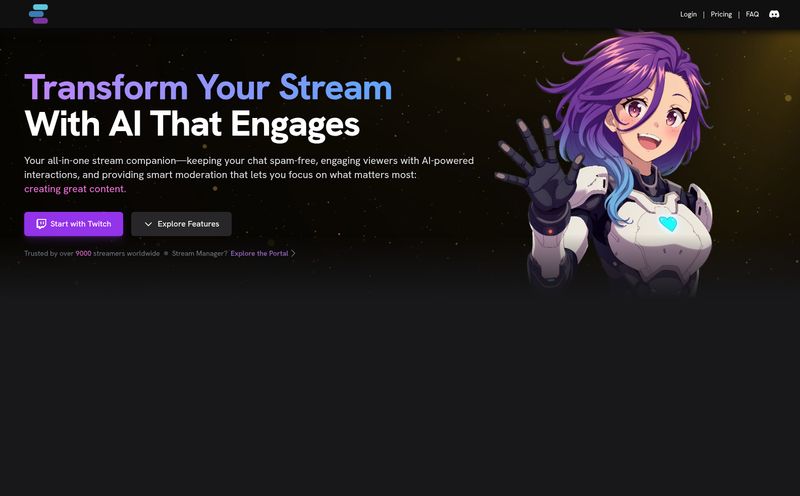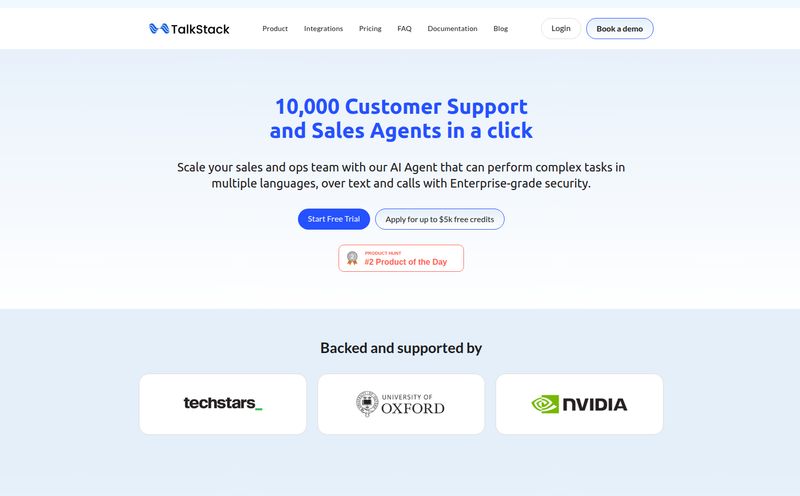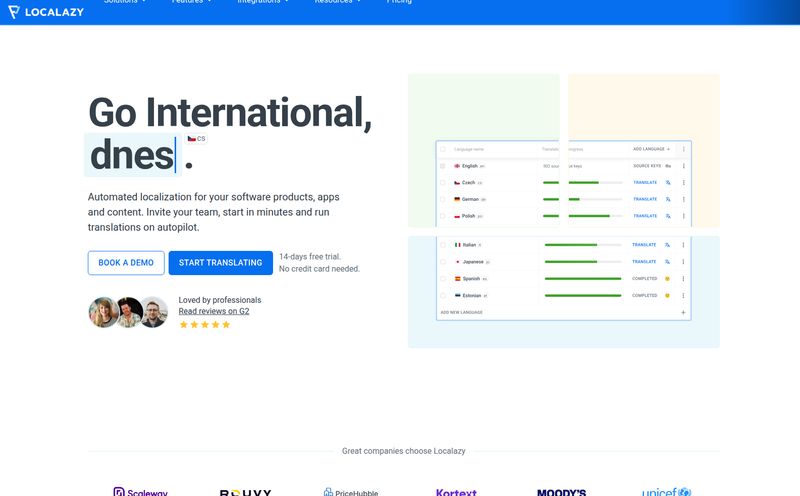If you've spent any time in the digital trenches over the last few years, you've seen the explosion of AI agents. Tools that promise to automate everything from booking your flights to handling your customer support tickets. It's exciting stuff, but for anyone who has actually tried to build one of these things, you know the reality is... messy.
I’ve lost count of the number of automation projects I’ve seen go off the rails. You spend weeks perfecting a script, an agent that can navigate a complex web app, and then boom. A frontend developer changes a CSS class name. A/B testing shifts the layout. The website throws up a new CAPTCHA. Your agent is instantly lobotomized, and you’re back to square one. It’s a frustrating, never-ending game of whack-a-mole against the chaos of the live web.
This is why when I first heard about a platform called Foundry, my inner, jaded SEO-slash-dev-nerd sat up and paid attention. They’re not just building another agent; they’re building the environment to forge them. The testing ground. The simulator. And that, my friends, might just be the piece we’ve all been missing.
So, What Exactly Is Foundry, Anyway?
In a nutshell, Foundry is a platform designed for the serious business of building, testing, and improving AI agents that work inside a web browser. Think of it less as a consumer toy and more as a professional workshop. This is where you’d go to build an AI to handle complex business processes—things like automating parts of your sales outreach, streamlining your hiring workflow, or creating a genuinely useful customer support bot.
The whole idea is to give developers a controlled space to do three things really well: build the agent's logic, evaluate if it's actually working correctly, and collect data to make it smarter over time. Simple on paper, but fiendishly difficult in practice.
The Core Problem Foundry Is Trying to Solve
Let's get real for a second. The internet is not a stable place. We call the constant, unpredictable changes to websites "web drift." It’s the silent killer of web automation. And it's not just layouts. You also have to worry about getting your server’s IP address banned or hitting rate limits that shut down your testing. Trying to train a sophisticated AI agent using reinforcement learning in this environment is like trying to teach a pilot to fly during a hurricane. You’re not getting clean data; you’re just getting noise and frustration.

Visit Foundry
This is where Foundry’s main proposition comes in, and honestly, it’s the part that gets me most excited.
Meet the Deterministic Web Simulator
Foundry’s secret sauce is its deterministic web simulator. That's a fancy term, but the concept is brilliant. It creates a perfect, repeatable copy of a web environment. Every time your agent runs a task in the simulator, the environment is exactly the same. The buttons are in the same place. The code is identical. The response times are consistent.
It’s a flight simulator for your AI agents. You can run the same test a thousand times and get a thousand identical results (assuming your agent's code doesn't change). This completely eliminates web drift from the equation. Suddenly, if your agent fails, you know the problem is with your agent’s logic, not because the website decided to serve a random pop-up that day. This is a game-changer for debugging and reliable benchmarking.
More Than Just a Simulator: Foundry's Toolkit
While the simulator is the star of the show, Foundry brings a few other critical tools to the workshop. It’s not just about giving you a clean room; it’s about giving you the instruments to conduct your experiments.
Scalable Agent Evaluation and Benchmarking
How do you prove your agent is getting better? Gut feeling? I’ve seen teams do that, and it doesn't end well. Foundry provides a framework for setting up specific tasks and clear success criteria. This means you can create a standardized test for your agents. You can run version 1.0 against the benchmark, then run version 1.1 after some tweaks, and get cold, hard data on whether your changes actually improved performance. You can finally answer the question, "Did that last update help or hurt?" with confidence.
High-Quality Data for Reinforcement Learning
Reinforcement Learning (RL) is a powerful way to train agents. It's basically a guided trial-and-error process where the agent gets 'rewards' for correct actions. But RL is notoriously hungry for data, and it needs good data. The platform includes a scalable annotation framework. This is a system that helps humans (or other models) label the agent's actions as correct or incorrect, creating a high-quality dataset. This clean, labeled data, collected within the pristine simulator environment, is exactly what you need to effectively train an RL model without pulling your hair out.
The Good, The Bad, and The Complicated
No tool is perfect, right? From what I can gather, Foundry has some massive strengths but also a few things to keep in mind. It's a professional tool for a professional problem.
On the plus side, the reproducible testing environment is a massive win. I cannot stress this enough. It turns the art of agent building into more of a science. The ability to collect clean data and perform scalable evaluations are huge benefits that stem directly from this. For any serious development team, this is the stuff dreams are made of.
However, there are some potential hurdles. The documentation suggests you might need some existing expertise in reinforcement learning to get the most out of it. This isn't a simple drag-and-drop builder. Also, the annotation framework, while powerful, will likely require a non-trivial amount of manual effort to get going. You still need humans to define what 'good' looks like, especially in the early stages. This isn't a con, so much as a reality check. Foundry gives you a professional kitchen; it doesn't cook the meal for you.
So, Who Is This Actually For?
Let's be clear: this probably isn't for the hobbyist looking to automate their social media posts. Foundry seems squarely aimed at tech companies and R&D teams who are investing serious resources into building robust, business-critical AI agents. We’re talking about ML engineers, AI developers, and product managers at companies that want to automate complex, high-value tasks and need the rigor and reliability to do it right. If you're building an agent that could impact your company's revenue or customer satisfaction, you need this level of control.
What's the Price Tag on This Thing?
Ah, the million-dollar question. As of my writing this, Foundry's pricing isn't public on their site. This is pretty typical for specialized, enterprise-grade platforms. My guess? It’s going to be a “contact us for a demo” situation. Expect subscription tiers based on usage, number of users, or the scale of your simulations. Don’t expect a $20/month plan. This is a tool meant to solve a six- or seven-figure problem for businesses, and the pricing will likely reflect that value.
My Final Two Cents on Foundry
I'm genuinely optimistic about what Foundry represents. For years, the AI agent space has been a bit like the Wild West—full of exciting possibilities but also chaotic and unpredictable. A platform like Foundry brings some much-needed law and order. It provides the infrastructure to move from brittle, one-off scripts to truly resilient, continuously improving AI systems.
Is it the final answer to all our problems? Probably not. You still need smart people to design the agents and define the tasks. But by solving the environmental problem—the web drift, the instability—Foundry allows those smart people to focus on the actual AI, not the flaky testbed. And that is a huge step forward.
Frequently Asked Questions about Foundry
What is Foundry in simple terms?
Think of it as a professional workshop and simulator for building AI that can perform tasks on websites. It gives developers a clean, stable environment to build and test their agents, away from the chaos of the live internet.
What does "deterministic web simulation" mean?
It means the simulated website environment is perfectly consistent and repeatable. Every time an agent performs a task in the simulator, the website looks and acts exactly the same, which is critical for reliable testing and debugging.
Is Foundry for beginners?
It seems to be geared more towards professional developers, ML engineers, and teams with some technical expertise, especially in areas like reinforcement learning. It's a powerful tool, not necessarily a beginner-friendly one.
How does Foundry help train AI agents better?
By providing a stable environment, it allows you to collect clean, high-quality data about your agent's performance. Its annotation framework helps you label this data, which is essential for training smarter, more effective models using techniques like reinforcement learning.
Does Foundry handle things like CAPTCHAs or IP bans?
The simulator environment is designed to bypass these real-world obstacles. Since it's a controlled simulation, things like IP bans, rate limits, and probably even standard CAPTCHAs wouldn't exist, allowing the agent to be tested purely on its ability to navigate the site's intended interface.
Is there a free trial for Foundry?
There's no public information about a free trial. For enterprise-focused platforms like this, the typical process is to request a personalized demo from their sales team to see if it fits your company's needs.
Reference and Sources
- For a primer on the core concepts, check out this overview of Reinforcement Learning on Towards Data Science.
- An interesting discussion on the brittleness of web automation can often be found on platforms like Hacker News.



